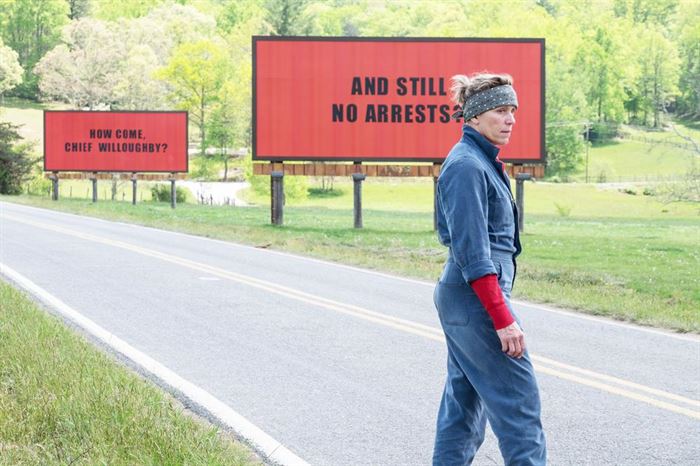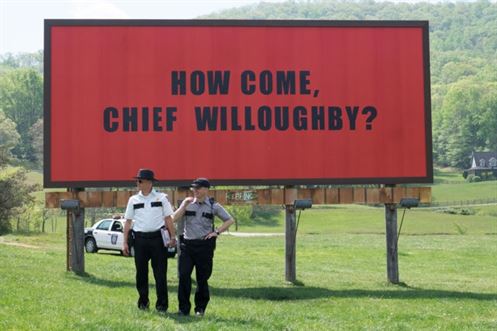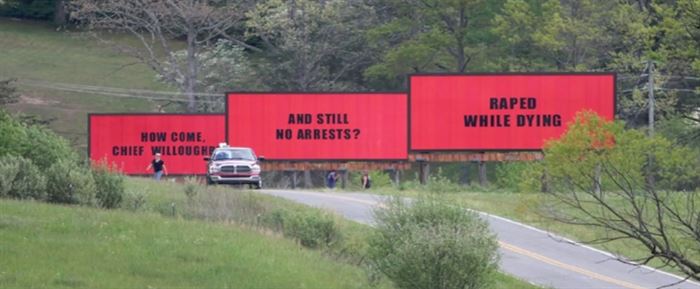Released during a time of increased awareness of women’s rights and corrupt police officers, Martin McDonagh’s “Three Billboards Outside Ebbing, Missouri” raises questions about morality, forgiveness and revenge.
“Raped while dying and still no arrests? How come, Chief Willoughby?” read the trio of titular advertisements. Mildred Hayes, a mother still grieving seven months after her daughter’s assault and murder, pays for these billboards to be displayed in her small town because “the more you keep a case in the public eye, the better your chances of getting it solved.”
This is a dark, unforgiving film in which all of the characters are morally grey. The plot takes unexpected turns and by the end, characters are viewed in totally different perspectives.
Frances McDormand stars as Mildred. For nearly the entirety of the film, she wears a loose-fitting mechanic jumpsuit with a bandanna. Combine her rugged appearance with her brash, foul-mouthed attitude and she is one of the most remorseless female leads of recent memory. It seems to be her verses the world. The police, the church, her son’s classmates and the town are all against her and her billboards.

Frances McDormand stars as Mildred Hayesin “Three Billboards Outside Ebbing, Missouri.”
Photo courtesy of Fox Searchlight Pictures
While watching the trailer, Woody Harrelson’s Chief Willoughby seems to be the antagonist, but he is a much deeper, three-dimensional character and far from evil. Sam Rockwell plays Dixon, the racist, hateful officer working under Willoughby. As the film progresses, more time is spent with Dixon and he is eventually seen as humane, causing some to call the film out for glorifying a racist cop. He is not a good person, but there are few good Samaritans in this movie. It is populated by angry, unforgiving characters who seem to only care about themselves. Just because their morals are askew, does that mean their stories are not worth telling?

Woody Harrelson and Sam Rockwell stand in front of one of the three titular billboards.
Photo courtesy of Fox Searchlight Pictures
Featuring a supporting cast including Peter Dinklage, Lucas Hedges, Abbie Cornish, and John Hawkes, there is no shortage of talent on display. While McDormand and Rockwell are receiving the majority of the attention, scooping up Best Lead Actress and Supporting Actor awards at multiple ceremonies, there is hardly a weak link in the ensemble. Evidence of this is the film’s win of best performance by a cast at the Screen Actors Guild (SAG) Awards.
The director of “In Bruges” and “Seven Psychopaths,” McDonagh wrote and directed “Three Billboards.” His signature blend of darkly comic dialogue and brief instances of casual violence shine in this film. The plot is not always coherent or sensible, and the tone quickly shifts without warning. Sometimes its comedy seems out of place, especially in the later half as the film gets heavier, yet it is not overbearing. Some may be too shocked to laugh, while others may have to stifle laughter. Without warning, a funny scene is undercut with a poignant piece of dialogue, reminding viewers that at its core, “Three Billboards” is still about a mother desperate to find some sort of vengeance for her dead daughter.
Since its collection of four Golden Globes and three SAG Awards, backlash has begun against McDonagh’s film. Some are claiming that the movie glorifies a racist, corrupt police force and elicits sympathy for Rockwell’s prejudiced character. While his surprising character arc certainly makes him more merciful, the film is not trying to show him as a good guy. In fact, none of these characters are admirable or really held accountable for the havoc they wreak upon the town.
McDonagh does not make movies about good people and making a film with violent, racist characters does not automatically mean the movie is racist. At worst, it can be accused of being insensitive.
“Three Billboards Outside Ebbing, Missouri” is a dark, shocking, funny, tragic and unique film, but maybe in the current political climate, a more nuanced film is more deserving of the Academy’s top honor.




